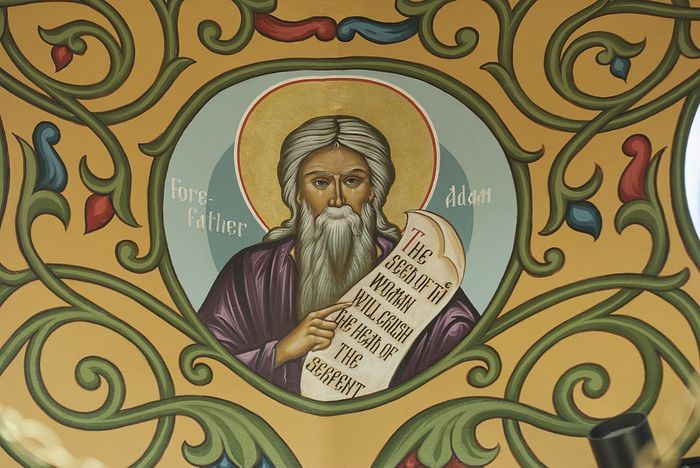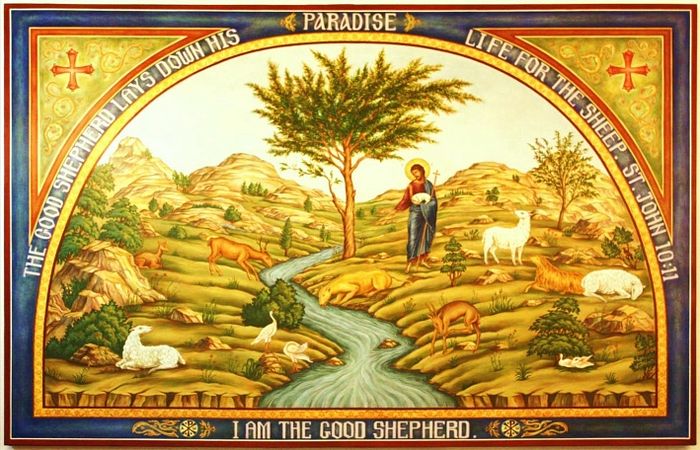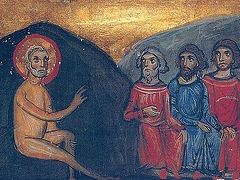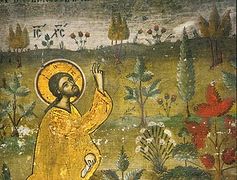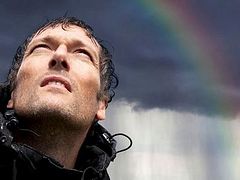The Fourth, Fifth, and Sixth Days of Creation
This fifth Bible Study on the book of Genesis covers the creation of Adam on the sixth day of Creation. In it we discuss several topics surrounding the creation of man, including what it means to be in the image of God, what it means that God "formed" man of the dust, the integral unity of man's body and soul, man's unique position as the summit of creation, and much more.
Below we present both the audio and text of the Bible Study:
MP3![]()
(MP3 файл. Продолжительность
Last time we covered days four and five and part of day six of Creation. On day four God created the heavenly luminaries, on day five He created birds and aquatic life, and on day six He created land animals, called forth out of the earth. Today we will talk about the creation of man which also happens on day six. As man is the summit and purpose of creation, his creation deserves its own lesson. Obviously it’s a very important topic—we are men and need to understand ourselves. It’s especially important to understand man and his creation because God becomes a man. What we say about man we are necessarily also saying about Christ, since the Incarnation. Of course when we talk about sins, that doesn’t apply to Christ, but what we say about human nature has to be correct, because we’re saying it about God as well.
The creation of man
26 And God said, Let us make man in our image, after our likeness: and let them have dominion over the fish of the sea, and over the fowl of the air, and over the cattle, and over all the earth, and over every creeping thing that creepeth upon the earth. 27 So God created man in his own image, in the image of God created he him; male and female created he them. 28 And God blessed them, and God said unto them, Be fruitful, and multiply, and replenish the earth, and subdue it: and have dominion over the fish of the sea, and over the fowl of the air, and over every living thing that moveth upon the earth. 29 And God said, Behold, I have given you every herb bearing seed, which is upon the face of all the earth, and every tree, in the which is the fruit of a tree yielding seed; to you it shall be for meat. 30 And to every beast of the earth, and to every fowl of the air, and to every thing that creepeth upon the earth, wherein there is life, I have given every green herb for meat: and it was so. 31 And God saw every thing that he had made, and, behold, it was very good. And the evening and the morning were the sixth day.
So there is the end of the creative acts of God, with day six. In the second chapter of Genesis there is a second telling of Genesis, with verses on the creation of man there as well:
2:7 And the Lord God formed man of the dust of the ground, and breathed into his nostrils the breath of life; and man became a living soul. 8 And the Lord God planted a garden eastward in Eden; and there he put the man whom he had formed.
21 And the Lord God caused a deep sleep to fall upon Adam, and he slept: and he took one of his ribs, and closed up the flesh instead thereof; 22 And the rib, which the Lord God had taken from man, made he a woman, and brought her unto the man. 23 And Adam said, This is now bone of my bones, and flesh of my flesh: she shall be called Woman, because she was taken out of Man.
As we’ve said in some past classes, the verses themselves might seem like they don’t contain too much detail, but we read according to what the Church Fathers have said because they open up the deeper spiritual meanings that they see because they have spiritual experiences and talk with and know God and come to know the spiritual state of Adam and Eve. They show us that the Christian conception of man is the highest possible idea of man, if you compare it to other religions or philosophies. Only Christians understand man as he truly is. We don’t reduce the glory of man.
There’s a lot we could say. For instance, St. Gregory of Nyssa wrote a book called On the Making of Man and in the introduction he has a list of thirty topics or so to talk about on the creation of man. I’m not trying to cover all of those, but just to say there is a lot we could talk about. Man is a deep mystery and there’s much to say.
We’ve been working with this principle of following the Church Fathers, because we believe as the Church teaches, that this period of Creation and when man lived in Paradise is only knowable through the spiritual life. Man can’t come to understand this period himself. Man is a product of that time and can’t understand his own creation. St. Theophilus of Antioch gives us this principle for interpretation: “as to what relates to the creation of man, his own creation cannot be explained by man, though it is a succinct account of it which holy Scripture gives.”[1] We won’t understand our own creation, but what we need is given to us in Scripture. Although it’s a succinct telling of the creation of man, the Fathers tell us, and specifically St. John Chrysostom, that we should concentrate on every word.[2] We should dive into the depths of every word, and not simply glide over the surface. Last time we read from St. Basil saying that every syllable is inspired by God. Don’t be fooled by the fact that it’s a short story of Creation.
Coming to know God
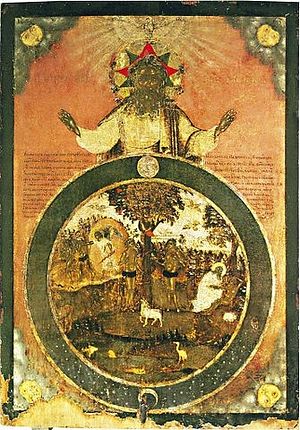 As I said, it’s important to understand our creation because we thereby understand God to a greater degree, and understand ourselves. It helps us to worship of God. when we understand the works of God we understand better how great He is. St. Basil says that as when a man travels to a new, unfamiliar country, he needs someone to lead him along, so he, as a bishop of the Church, is teaching to guide people. And when he does this you will,
As I said, it’s important to understand our creation because we thereby understand God to a greater degree, and understand ourselves. It helps us to worship of God. when we understand the works of God we understand better how great He is. St. Basil says that as when a man travels to a new, unfamiliar country, he needs someone to lead him along, so he, as a bishop of the Church, is teaching to guide people. And when he does this you will,
see man’s first origin and his immediate seizure by death, brought forth by sin, the first born of the evil spirit. You will know that you are formed of earth, but the work of God’s hands; much weaker than the brute, but ordained to command beings without reason and soul; inferior as regards natural advantages, but, thanks to the privilege of reason, capable of raising yourself to heaven. If we are penetrated by these truths, we shall know ourselves, we shall know God, we shall adore our Creator,
and we will understand how great is God, to what degree we can. God is always greater than we can fully understand. And he says,
we shall serve our Master, we shall glorify our Father, we shall love our Sustainer, we shall bless our Benefactor, we shall not cease to honour the Prince of present and future life, Who, by the riches that He showers upon us in this world, makes us believe in His promises and uses present good things to strengthen our expectation of the future.[3]
Again, it’s important to understand what Genesis is telling us because so many people today have the idea that Genesis isn’t actually telling us that much, or that we can change and reinterpret it to fit modern theories. But here St. Basil says that when we actually understand what Scripture is telling us then we can worship God—we will fulfill our purpose. Our purpose is to know, worship, and glorify God, and studying and knowing the Scriptures and the creation of man will lead us to that.
The one story of the Old and New Testaments
You can’t just change and reinterpret the story, because the Old and New Testaments are one story. Altogether they give us one story of salvation. The Old Testament speaks to us about Christ and prepared us for Christ, and in the New Testament He comes. So if you change how you understand the Old Testament you’re also changing how you understand the New Testament. If the Fathers said that Adam truly existed as a man you can’t change it and say he only exists as a symbol, and think that it only affects the Creation story. It affects everything.
St. Justin Popovich, a great twentieth century Serbian saint, says:
The New Testament anthropology stands and falls with the Old Testament anthropology. The entire Gospel of the Old Testament: man—the icon of God; the entire Gospel of the New Testament: the God-man—the icon of man. Heavenly, divine, immortal, everlasting, and unchangeably human is the icon of God in man: godlikeness.[4]
The Old Testament was the basis on which the New Testament is built. If you take away the foundation you destroy the house. If the Old Testament falls then the New Testament falls, so we have to stick precisely with what the Church teaches, because it’s coming from God Himself. The Fathers understood their own hearts, and their own souls, and therefore it’s how we should understand ourselves.
In The Exact Exposition of the Orthodox Faith by St. John of Damascus there are many chapters on Who Christ is—how many Persons are in Christ? How many natures, how many wills, how many energies? He’s talking about Christ but you see that everything he says also applies to man. He refers back to Adam. Everything is about Christ and it’s also about us, or how we should be. These things are necessarily connected and cannot be separated.
Crown of creation
Over the past several weeks we’ve talked about the creation of everything else, and the Fathers say that the fact that man is created last tells us that everything before him is prepared for him. It’s not just accidental that man came last. There’s a purpose. Man is the highest point, the summit and crown of creation. Christ Himself is the purpose of creation, but man, being in the image of God, is also the purpose of creation. Creation is for us. Man is a king and so his kingdom was being prepared for him. Or if a king travels to another town then his retinue is going before him, announcing his coming.[5] All of Creation has been the servants of the king coming first to announce his coming. In this we see comparatively how much greater is man than the rest of creation. God doesn’t just call man the king because creation needs a king—he’s actually higher; he’s actually better.
St. Gregory of Nyssa talks about all of creation being adorned with its beauty and being prepared for man. The land is full of its animals and plants; the earth is full of produce; the Trees are fruitful; there are mountains and hills and everything that makes nature beautiful; birds are singing and rejoicing and all of nature is full and alive. But no one was there yet to share it.[6] The animals were there and they have a higher life than the plants, but they don’t have the rationality that we do to enjoy nature as we can. All was created but man was necessary to fulfill it. The kingdom has been prepared.
26 And God said, Let us make man in our image, after our likeness: and let them have dominion over the fish of the sea, and over the fowl of the air, and over the cattle, and over all the earth, and over every creeping thing that creepeth upon the earth.
Let “Us” make man
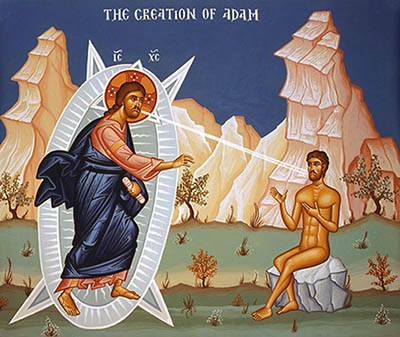
There’s a lot of important stuff in this one verse. Of course as Christians in the Church we already clearly know this, but the Jews only accept the Old Testament. When we read this verse we see that God said let us make man in our image. As Christians what does that speak to us of?
Student: The Trinity.
Of course. Let us make man in our image. As it’s plural, as Christians we of course see the Trinity, and some of the Fathers specifically say that this isn’t God talking to angels. The Jews don’t have a Trinity, so why is God speaking in the plural? Is it just poetic, or is He talking to angels? The Fathers say this cannot be. What do you see in this verse that indicates to you that it’s impossible that He’s talking to angels?
Student: Our likeness.
What about it?
Student: Angels do not look like men.
Right, or rather, they don’t have the same image and likeness as God. And yes, they’re not like men. So in this one verse we see both singular and plural, which is Christianity—One God in three Persons. Let us make man—that’s the Persons of the Trinity—but in our image—one image.
Student: It’s not easy to understand this from the text.
It’s easy to just pass over it. But St. John Chrysostom told us not to do that.[7] So, Let us make man in our image—there’s one unified image between this “us.” As Christians we know this is the one nature of the Trinity. The Father, Son and Holy Spirit are one God, possessing one Divinity. The angels are not of the same image, so we know He’s not speaking to angels.
This was very important in the early Church, because there were always heresies that didn’t understand Who God is and Who Christ is. We’ve talked before about the teaching of Arianism in the fourth century which said that Jesus is not God but a great creature. The Fathers see this verse as defeating Arianism because if Christ is just a creature then they don’t have the same image. He couldn’t say let us make man in our image. The Fathers see here the teaching of the Trinity which therefore defeats the teaching of heresies. St. John Chrysostom[8] and others specifically point this out.
Divine consultation
We see a distinction here. Whereas God created everything else by a spoken command—let the waters bring forth—He doesn’t just say “let there be man.” It’s as if the Persons of the Trinity have come together and are discussing this act. Of course we shouldn’t interpret this too literally. We don’t believe that the Trinity actually needed to have a discussion to know what to do. They share one will because they have one essence. They all want the same thing. They all knew they would create man and how to do it, but Moses writes this way, and God showed it to Moses this way, so that we would see a difference, as if more attention is being given to man. The Fathers say they have deliberated and this shows the dignity of man—that he was given special care and attention that the rest of creation was not. For instance, the Venerable Bede and others, said that the Trinity is shown discussing is a sign of man’s rational nature as well, because only man can do this.[9] The plants and animals don’t do this, and so the fact that we were created this way is a sign to us that we are unique in having this reasoning ability.
The image of God
Being in God’s image can mean many things. In the book of Ephesians St. Paul says God is just, holy and true (4:23-24), and therefore man is just, holy and true, or at least we’re supposed to be.
Student: We’re supposed to be, but everyone has his own will, and that’s why he can choose to do evil.
You’re right. The second that Adam was created he already had these qualities of just, holy, and true, and as she said he has the free will to either continue in and strengthen and deepen those qualities, or to turn the other way. But man in his nature should have these qualities. They’re hidden within us and God uncovers them.
But what does it mean to be in the image of God? Images are usually material things, but what does God look like?
Student: To follow the will of God is to be in the image of God.
So you would say it’s more about how we behave—it’s about our spiritual nature?
Student: I mean about the relationship between man and God, but not the nature of man itself.
Would you say the body is involved in this image of God?
Student: Yes, in accordance with the Trinity—the body, soul, and spirit.
We can say that man is a tri-partite creation—body, soul, and spirit. Yes, that’s an important point—man has three parts, like the Trinity—although we shouldn’t say “parts” about the Trinity—each “part” is fully God. But of course before the Incarnation God did not have a body. There was no physical substance of God, so when it says in his image it doesn’t mean our appearance is that of God, although I believe St. Athanasius does say that man was formed in such a way that when Christ took a body it would be fitting for Him.[10] God didn’t have a body but somehow our bodies do fit Him. The image of man is ultimately bound up with his spiritual nature, and in the fact that man is rational and has free will and the ability commune with God and one another. Christ is the Word of God and man is the only creature that has word. These are all signs of the image of God.
Man is not an animal
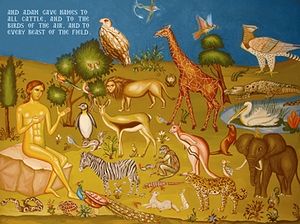 Adam named the animals, having dominion over them But, as I said, in some way this body that we have is suited to this soul. The image is in the spiritual nature, but the body is also man. They go together. This is an important point because some people today will say that in his body, considered apart from his spiritual nature, man is just an animal. But the Fathers tell us that even the body of man is suited to the soul of man. No animal has the same kind of soul as a man, so they don’t’ have the same kind of body. Even in our physical nature we are above the animals. This is a very important point.
Adam named the animals, having dominion over them But, as I said, in some way this body that we have is suited to this soul. The image is in the spiritual nature, but the body is also man. They go together. This is an important point because some people today will say that in his body, considered apart from his spiritual nature, man is just an animal. But the Fathers tell us that even the body of man is suited to the soul of man. No animal has the same kind of soul as a man, so they don’t’ have the same kind of body. Even in our physical nature we are above the animals. This is a very important point.
Man has dominion over the lower creation which is part of the image of God. God is the King Who reigns over everything, but He lets us reign over earth. We have this bit of godlikeness in us. His dominion, his reason, his freedom—all of these things are what makes up the image of God.
St. Gregory of Nyssa sums up the image of God well: “He creates man for no other reason than that He is good;” and He wanted us to share in the good life.
And being such, and having this as His reason for entering upon the creation of our nature, He would not exhibit the power of His goodness in an imperfect form, giving our nature some one of the things at His disposal, and grudging it a share in another: but the perfect form of goodness is here to be seen by His both bringing man into being from nothing, and fully supplying him with all good gifts.
Man had everything that he needed to live. The earth was full of food and man, more importantly, spiritually had everything he needed in order to commune with God. Man was created just, holy, and true, full of virtue in a state of grace communing with God. He continues: “the language of Scripture therefore expresses it concisely by a comprehensive phrase, in saying that man was made ‘in the image of God’: for this is the same as to say that He made human nature participant in all good.” By saying that we’re in the image of God, we participate in all the good qualities of God. Of course He is Uncreated and we are created, but we share in the same qualities. “For if the Deity is the fullness of good, and this is His image, then the image finds its resemblance to the Archetype in being filled with all good.”[11]
But, St. Gregory says the most important thing “is the fact that we are free from necessity, and not in bondage to any natural power.”[12] We have our free will and originally man had no necessities. Man ate but he didn’t need to. He could have never eaten and he wouldn’t have died. We were given food in order to experience something good from God; it should have been mainly a spiritual experience for us. St. Gregory says the most important thing is that we’re free from necessity, because God needs nothing. He is perfect, and really our only necessity was God. Man’s entire life is supposed to be focused on God.
Of course the body is necessarily bound up with this because the body itself is meant to be a vessel of grace. At Sretensky we have the relics of St. Hilarion Troitsky, for example. The relics are the body, but they contain grace. The image is the spiritual nature of man, but it sends grace to the body and when we die, if we were holy, the grace remains there.
Several aspects of the image of God
We can say there are five manifestations of the image and likeness:
- Freedom
- Personhood: There are three Persons in the Trinity
- Love: We can say our dog loves us but it’s not the same as when parents love their child or when husband and wife love one another. It’s much closer to Divine love. Of course even our love is not like Divine love, but it should become more and more so.
- Lordship and priesthood over creation
- Cooperation with God: We see that God calls us to multiply and replenish the earth, so we’re called to participate in His creative work. God created it all and man is given the task of keeping it going and spreading the goodness.
Image and Likeness?
So, it says Let us make man in our image and after our likeness. Why does it say image and likeness? Literally these words are basically the same, so why are there two terms?
Student: The image is something you already have and likeness is something you have to work towards.
Right. So the image is what’s given to us from creation that everyone has. But the Fathers say the likeness of God is the ability to move closer to God and we are meant to grow evermore in His likeness, so a saint has more of the likeness of God or is closer to the likeness of God than we are.
Student: To develop our best qualities?
To acquire the qualities of God.
Student: We should not just sit and relax and think we don’t have to do anything because we have the image of God.
That’s why we have podvigs and fast and pray. Without the help of the saints and commentaries of the Church Fathers it’s easy to read the Bible and think that Adam and Eve were totally perfect and just meant to stay as they were. But the Fathers say the likeness means we are called to grow. Even Adam and Eve, although they were sinless, were meant to grow higher. This is an important distinction. The Church teaches us that at the Fall the image is not lost. Outside of the Garden they are still in the image of God, although it is damaged and darkened, and our ability to use it and grow in the likeness has been hurt. We never lost our free will but it becomes harder for us to do the good. Before the Fall the spiritual nature of Adam and Eve directed their bodies and was in control, and so it was easy for them to see and understand and do the will of God, but at the Fall it all turned upside down and now our material nature is more in control. We think more about bodily necessities, and especially bodily passions. Man has been reversed. Now it’s harder for us to see the higher things of creation and the will of God. We’ve become like cattle with our heads pointed to the ground, focused on earthly things. As man we walk erect and can point our heads to the sky, but spiritually we’ve become more like animals.
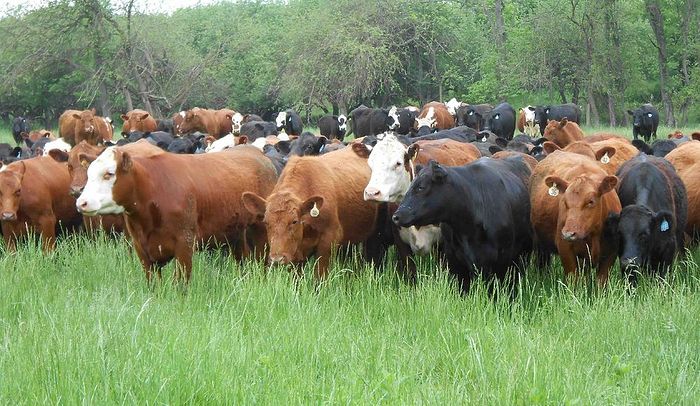 In sin we become like irrational cattle
In sin we become like irrational cattle
The image has been impaired, but not lost, and we do see righteous people in the Old Testament. The story of the Old Testament is the story of God preparing us for Him to come, and to heal our nature, to fix what has happened. We see that God immediately starts doing this and gives a prophecy of the Incarnation in Genesis 3:15 when He says there will be enmity between mankind and the snake and He prophecies a woman and that man will defeat the serpent. His coming is immediately prophesied to Adam and Eve, and that’s why all of mankind, even though we aren’t all Orthodox, has parts of the truth. Everyone comes from Adam and Eve and then from Noah, so we all have retained parts of the truth. The fullness of course is only in Orthodoxy. The various covenants that God makes with man are preparing us for the image to be restored and the ability to grow in the likeness of God.
Fr. Zacharias, an archimandrite at the monastery in Essex founded by Elder Sophrony said that when God created man He created nothing less than Himself, which sounds pretty wild. It can’t be totally literal—of course we are less than God, but man is meant to be everything that God is, but we will be that way by grace, whereas God possesses these things by nature. In and of Himself He possesses these qualities by nature, and we share in them by grace. There will always be that divide of nature, but we are called to be everything that God is by grace. This is the Orthodox concept of theosis.
Student: It is inspiring.
Hopefully it is! This is why we have saints—they show us that this is possible. Not all Christian groups care about the saints. When I was an Evangelical I had heard of St. Augustine, but that was about it, except for the saints in the Bible. Only Orthodoxy has this idea of man—that we are called to be everything that God is by grace. Only Orthodoxy teaches this glorious vision of man. The saints, and especially the Mother of God, show us that it’s not just fun stories. It can really happen.
Angelic life
We are called to live the heavenly life. How many ranks of angels are there?
Student: Nine.
In English they are the angels, archangels, cherubim, seraphim, principalities, thrones, dominions, powers and virtues. There are nine ranks of angels, but the whole world understands ten as a nice, round number of fullness. Man is meant to ascend and become higher than the angels. You could say we are called to be like the tenth rank and fill up the number of angels. Of course the Church is both men and angels. We say that monks and nuns take up the angelic schema and live the angelic life. It’s more than just nice words, there’s truth to it. They attempt to live as fully as possible the angelic life that man is called to live.
According to the image?
The King James Bible says Let us make man in our image so the English-speaking world knows this phrase, but really it should be more like Let us make man according to the image, because Who is the image of God, of the Father? St. Paul says, for instance in Col. 1:15 and Hebrews 1:3, that Christ is the image of the invisible God, and the express image of His Person. Christ Himself is the image of the Father, and we are made according to this image. We are in the image of God, but more specifically we are in the image of Christ. We get our personhood by being in the image of His Person, and then He becomes human. He gives us the image and then He takes it from us. Christ is what constitutes the image of God, and therefore man is in the image of Christ. Man is the image of the image. Man is the first material icon. Even before the Incarnation, everything is Christ-centered, even when He’s in the shadows and the Trinity is not revealed. When we read with the Church we see that everything is already about Christ.
Male and female
Scripture goes on to say that God created both male and female. The Venerable Bede points out that God made many of each animal, but He created just one male and one female. The Fathers see this as distinguishing man. Bede goes on to say that this is so that we would all come from just one pair and it would increase the bond of love with one another.[13] We all come from this one bond and have a family relationship and the same nature.
Of course everything that God creates is good, and after man it’s very good, and we see here that He created male and female. Unfortunately in our modern world we need to emphasize this. The pairing of male and female together as help-meets in a marriage relationship existed in Paradise. God created male and female, not male and male or female and female. Of course you have it here in Russia, but especially in America, every day we’re being forced more and more to accept these things as good. Now men want to become women and use their bathrooms. It’s insane. But the life of Paradise has man and woman together. The Scriptures often talk about Christ as the Groom and the Church as the Bride. You never read about the Bride and the Bride. God and His own Church are following this pattern. That tells us something.
And some people want to become animals. This is insanity. Man is given so much dignity and is so much higher than the rest of creation, and yet people want to live as cats. But, as we all know, these people have problems, and we have to treat them with love. Unfortunately there are people who hate such people. We’re all sinners and they just have more obvious sinners. They need to be treated with love. They need Christ. We all know this, but let’s remember.
We participate in the good that God has. The love of God is free—the Father, Son and Holy Spirit freely love one another and love us—nothing makes them do it; it’s total—they hold nothing back; it’s faithful—God has promised to love and us and He will remain faithful to that promise; but His love is also fruitful. It is spiritually fruitful of course—when He loves us we grow spiritually, but literally His love gave rise to creation. This shows us that true love has to be fruitful, and that means a man and woman. Only that pair can continue the act of creation and multiply and replenish as we are called to do. This is obvious to us.
Dominion over creation
It’s in the next verse that God says this: And God blessed them, and God said unto them, Be fruitful, and multiply, and replenish the earth, and subdue it: and have dominion over the fish of the sea, and over the fowl of the air, and over every living thing that moveth upon the earth.
The Venerable Bede asks what it means to have dominion over the animals.[14] As we’ve said in past classes, animals weren’t dying in the original creation. For instance, St. Basil specifically says that vultures weren’t circling the earth looking for food, because there was no food to find.[15] Everything ate plants. So what does the dominion mean if they weren’t for our food? He answers that perhaps God said this knowing that man would fall and we would need this kind of dominion over the animals, but he says in the fall this dominion was actually lost. Before the Fall animals were the servant of man. St. Paisios says that animals came up and lovingly licked the hands of Adam and Eve,[16] and a bear would bring food to St. Seraphim, and St. Gerasimus had a lion in the desert, but this was lost in the Fall. We still have dominion over certain animals, such as our pet dog, but if the dog is big enough he can have dominion over us. This has been reversed and man is often controlled by his fear of animals, rather than animals being controlled by the goodness and grace of man. St. Theophilus says that when man fell all of creation sinned and fell with him. When the king became mortal he deserved a mortal kingdom.[17]
St. Ephraim points to this dominion as making up the image of God.[18] But this dominion is also not only literally. As we’ve emphasized this is indeed literal history in the eyes of the Fathers, but there’s always deeper meanings. In the Scriptures and in ascetic literature animals can be used as images of sin and the passions. To have dominion over the animals is also to have dominion over the animal passions that are within us because of the Fall. Because of the Fall our material nature took over and we have become more like animals. Of course we are still not animals but we are more like them, but still called to have dominion over these beasts.
Student: Do they associate particular animals with particular passions?
I didn’t come across that, but maybe.
Replenish the earth
God planted the Garden in the east and placed man there, but man is meant to replenish the entire earth, so he’s meant not to expand beyond the boundaries of Paradise, but to expand the boundaries of Paradise. St. Maximus teaches about the five distinctions that man is called to overcome, or unite. For instance, between God and creation there is a division of natures. But within the created world there is Paradise and there’s the rest of the earth, and man is called to make the rest of the earth into Paradise by growing closer to God.[19] Replenish the earth—not just Paradise, and to subdue it—that is, take it under his control and make it all Paradise. Man is the mediator and priest—He receives grace from God and that affects all of creation.
Student: How does this commandment concern monks?
There’s always spiritual meanings. St. Anthony lived alone in the desert but his example has inspired how many millions of monks? He has spiritually replenished the earth.
Student: I’ve heard people say that the earth is over-populated, so we don’t need to replenish it.
Well this commandment to be fruitful and multiply is the first commandment given to man, so it’s obviously important, and we never see God canceling it.
Student: Are women then meant to have a lot of children? Are they forbidden to be child-free?
I wouldn’t say they’re forbidden to not have children.
Student: But has the meaning of this commandment changed in the New Testament?
I’m not aware that this commandment has ever been canceled or changed. Strictly speaking, the Church is against contraception, so if you get married and have relations you’re supposed to be open to the possibility of having children. I can’t say therefore every woman must get married and have children. Although we are given commandments it’s also very hard to say everybody must do it the same way. We have spiritual fathers to help us to discern our path. I certainly wouldn’t say a nun is breaking this commandment.
This is an important question—what did it mean for Adam and Eve before the Fall to be fruitful and multiply in the Garden? It’s a basic teaching of the Fathers that marriage as we know it, and childbearing as we know it, are realities from after the Fall.[20] St. Gregory of Nyssa says that man would have multiplied in some other way that we don’t know.[21] Man’s life in the Garden was much more spiritual. We had physical bodies but even they were lighter and in some way more spiritual. We didn’t have bodily passions or needs, and this includes sexual passions. They just weren’t there. In the New Testament Christ says we will live like angels, and He says some are eunuchs from birth, some are made that way by men, and some choose that path for the sake of the Kingdom, and if you can do this, you should do this (Mt. 19:12), because that’s the life of the Garden—to be above these passions. Of course, this doesn’t mean marriage and sex are bad. It’s still God that put Adam and Eve together and gave us this mean of keeping this commandment, but the Garden life is a step above. It’s a common teaching that the monastic life is on another level. That doesn’t mean every monk is greater than every married person, but in terms of states of life, it’s a higher level.
So they were virginal, but yet called to multiply. Obviously if we get married and have children we’re not virginal. And if you choose to be a monastic you won’t have literal children, but this was our call. Who does that remind you of?
Student: Mary.
Of course! In this sense we can say that the Mother of God is the only person who has lived the life of Paradise, as both virgin and mother. Perhaps before the Fall God would have just intervened in the way that He did with her. We see that Christ Himself lived this way, and the greatest saints—the Mother of God, St. John the Baptist …
Student 1: Christ Himself didn’t multiply, but He observed all the commandments.
That’s true.
Student 2: Maybe this is about spiritual fruit and spiritual children.
Student 1: This is the answer to your question. How do monks multiply? Christ-like.
Mode of origin—mode of being
We are children of God. He reveals the Church and we become His children through Baptism. All of us after Adam and Eve are born through sexual reproduction whereas they were created by God. The fact that they had a different beginning means they lived differently. The mode of origin and mode of being are correlated. In the Trinity the Father, Son, and Holy Spirit are exactly the same in every way, except for Their origins. If the Father is good and loving then of course the Son and Holy Spirit are too. But the distinction is that the Father has no cause. He simply is. The Son is eternally born from the Father, and the Spirit eternally proceeds from the Father. These three modes of origin distinguish Them as Persons. And we can apply this to man. We come into life through the fallen mode of reproduction and therefore we are born into the fallen nature. Christ was conceived virginally in the unfallen mode of reproduction and therefore He took on unfallen human nature. This shows us, as I said in the beginning, that what we say about man we say about Christ. These are always tied together. Baptism is our new birth, our new mode of origin in which we take on the new mode of life, and hopefully we will live according to that Baptism.
St. Basil says the animals were also called to multiply, but for them it’s obviously bodily, but man is called to multiply more specifically according to the inner man in progress towards God. He sees in this blessing and calling an image of the Church, which is meant to multiply the Gospel throughout the world.[22]
Given to man for meat
In verse 29 God says that every plant is given to us and the beasts for food. But it’s very specific that every herb bearing seed and every tree is for us. The Fathers say it’s clear that before the Fall nothing was harmful and nothing was poisonous.[23] Today there are mushrooms that can kill us, but before the Fall we had every plant for us. Nature was still in harmony with itself and with man.[24] Nothing was hurting other things. Some people say that if man ate plants then the plants were dying. Firstly, if I pick an apple off of a tree and eat it, I haven’t killed the tree. If we eat the fruits or leaves it doesn’t indicate the death of the entire plant, even in our fallen world. So in our pre-fallen world how much more is it not this way? We can’t look around at our corrupt and dying world and think that Paradise was that way. Things were different. This world is not our key to that world. Our key is spiritual experience.
St. Gregory of Sinai, a great hesychastic father of the fourteenth century, had great experiences. In talking about Paradise he says that “When trees and ripe fruit rot and fall to the ground they turn into sweet-scented soil, free from the smell of decay exuded by the vegetable-matter of this world.” Even the rotting is somehow different. It’s just converted into a different form of pleasantness for man. He explains that this “is because of the great richness and holiness of the grace ever abounding there.” It might sound like some form of corruption because he says “rot,” but, he goes on to say: “It is said that when the world was first created it was not subject to flux and corruption.”[25] Even though there is some form of “rotting” it’s clear that he believes this is not a form of corruption.
Because everything was different we simply don’t know what happened when Adam ate fruit.
Student: Maybe they didn’t need to eat at all.
They didn’t need to, you’re right. They did eat, but it wasn’t a necessity. They ate because it was something good that God gave them to experience. Now we eat to live.
Student: And for communication.
You mean with God?
Student: And with one another.
To sit down at a meal?
Student: Yes and to have a talk. We invite someone to tea.
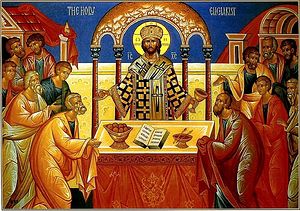 Communicating with the Lord at His table I think that’s a good insight, because our highest form of talking with God is what? The Eucharist—the Mystical Supper.
Communicating with the Lord at His table I think that’s a good insight, because our highest form of talking with God is what? The Eucharist—the Mystical Supper.
Again, we simply don’t know how things worked. When Adam ate fruit what was happening inside of his body? We don’t know. We know enough to say that we don’t know, and so we can’t say it must have been some kind of death. It didn’t have to be. It was Paradise.
Even after the Fall there is no immediate permission to eat meat, and before the Fall it’s impossible. Animals have a higher life than plants and so to eat an animal you would have had to kill it, and that’s not something that happens in Paradise. St. Basil says that at first we were given the legislation that allowed us the use of fruits because we were still judged worthy of Paradise.[26] Eating meat is not a sin, because God did tell Noah that we can. It’s a fact of life—we are fallen and need to eat.
Student: Isn’t there now enough food that we don’t need to eat meat and fish?
Even Christ ate fish. Monastics don’t eat meat, not because it’s a sin, but because there’s a higher way. Christ ate fish to prove that He was human, and even after the Resurrection that He still had a body. But, the fact that He ate it proves that it’s not a sin.
Student: I don’t mean that it’s sinful, but is it better not to?
It’s probably better if you’re doing it for the sake of God. If you’re doing it because you think we’re brothers with the animals then that’s not good.
“Very good”
31 And God saw every thing that he had made, and, behold, it was very good.
On every other day He said “good” but now it’s “very good” because His own image has been made, or rather something made according to His image—something that can sanctify and deify all of creation. And that it’s very good means there was no evil. God did not create evil, but it exists when we choose to do it. It is the absence of good. Adam and Eve were created good and when they chose to turn from that that’s when evil came about. Everything that God created existed as an idea in His mind before all of creation, and obviously the thought of evil did not exist in the mind of God. And St. Basil says that death is one of these evils that God did not create,[27] and the Wisdom of Solomon says explicitly that God did not create death of any kind. It’s clear that he’s not talking about only man.
Garden time
So the evening and the morning were the sixth day. How long was this day?
Student: Twenty-four hours.
Beautiful! The Fathers are consistent and have no problem saying the day is twenty-four hours. St. Basil and others specifically note that the first day of creation became the definition and model for all other days. Some people say that creation was in a higher spiritual level so you can’t talk about time before the Fall. The angels live in a different sense of time than us. Or people say there were no days before the fourth day when the sun and the moon were created. But the Fathers obviously realize that the Scriptures talk about the sun coming about on the fourth day and they say it’s literal, and that it doesn’t matter—the day is defined by the period of time, and the heavenly bodies are how we measure it. If they disappeared time would still go on.
Student 1: It’s interesting that Adam and Eve lived in Paradise only for twelve hours.
Student 2: Why do you think so?
We sing about it in Lent at the sixth hour, and it’s also in the Synaxarion for Holy Friday.
Student 1: Christ was crucified at the hour of the Fall, when Eve took the fruit.
There is definitely this tradition. At the sixth hour man fell by a tree and at the sixth hour man is saved by a tree. And it was the same day.
Student: So man was created on Friday?
Yes.
Student: And he sinned on …?
Friday. It’s not explicitly stated in the Scriptures but it’s Church Tradition.
Two Creation accounts
We have finally finished chapter one! And chapter two gives us more precise details about the creation of man, in this second telling of Creation. Fr. Seraphim makes a very important point here. Not only him of course, but we can always listen to Fr. Seraphim. He says that chapter one describes Creation more generally—the creation of mankind, and in chapter two it becomes more specific and tells us about specifically Adam and Eve. Some people try to say that these two contradict, or that the chronologies are different. The chronology of chapter one is very specific—one day after another. And chapter two is less strictly chronological and that is clear. It’s more of a story format. But people who don’t want to interpret Genesis literally try to make these stories contradict, so they don’t have to take them seriously. But it’s a stretch to try to make them contradict. Also, St. John Chrysostom and several other Fathers say that Scripture never contradicts itself,[28] because every syllable is inspired. Two inspired syllables cannot contradict one another.
The body of man
2:7 And the Lord God formed man of the dust of the ground, and breathed into his nostrils the breath of life; and man became a living soul.
We have said that when God created on the first day He didn’t create out of pre-existing matter, but out of nothing. But after that the matter of the first day was used to create other things—animals were called out of the water and ground. God was fashioning what was already there, and we see this also with man—His body was not created out of nothing but out of the dust of the ground. But God didn’t just speak and create but formed man out of the dust of the ground, which, again, requires the work of our hands. There was a more personal touch to it. Here you can’t interpret it entirely literally because God doesn’t have literal hands. God is pure spirit, but it’s teaching us that God gave extra care and attention and that man is above everything else.
Student: So there is no connection between animals and humans, even though they were created on the same day? It’s clear from this that animals and humans are completely different?
That’s right. The creation of animals is like everything else—let the earth bring forth—but here God is more personally forming. Man and animals are both from the ground, but it’s different. As we said, the body of man is made to suit his rational soul, which animals don’t have. Even in his body man is already unique.
Student 1: But the human body was different then than it is now, right?
Yes.
Student 2: But it was still earthly.
Yes, it was still material, but the spiritual side ruled over it and made it more spiritual. Think about Christ after the Resurrection, walking through doors. He still had His body.
Student 3: But it wasn’t material.
It was! Even our material bodies that we have now are more material than they’re meant to be. There are degrees of materiality. For instance, God is pure spirit, before the Incarnation. There is no material nature to God at all, and there are the angels who are spirits, but yet compared to God they do have bodies in some way. God alone is purely spirit, but when you compare the angels to us we say they don’t have bodies. They do have some kind of body to them but it’s much more spiritual than ours, but less spiritual than God. Even our bodies changed and fell into a more material quality. They were heavier and came to be in control rather than to be controlled by the spiritual nature.
Even the body of man is not an animal, and we specifically see that God created it. The genealogies in the Gospel trace back from Christ, and when it gets to Adam, it says he was the son of God. Adam wasn’t the son of something that was almost, just on the verge of being human. Adam is from the ground, and if we take that seriously, he had no parents. He is obviously not the product of some long, slow process. The Fathers have no problem saying that man was actually created from the dust. If he is part of some process then the creation of his body is not unique in any way, and you’re robbing man of his dignity. For instance, Theodoret of Cyrus emphasizes that man is not spoken into existence but is created in a more personal way by God’s hands.[29] St. Basil even says we are specifically given this information so that we wouldn’t classify man with the animals.[30] Even in his body man is not an animal.
Student: It’s a great temptation.
Indeed. Even if we don’t go so far as wanting to live like a cat, lots of people today believe that we are just animals that have extra abilities. We just have a better computer. The difference between us and animals is just quantitative, not qualitative in their minds.
The name of Adam
The name “Adam” comes from the Hebrew “adamah” which means clay or ground. People therefore say it can’t be a real name and only symbolizes that he came from the ground. But why does it have to be a symbol? Maybe God gave him the name Adam because he’s from the ground, or maybe the Hebrew word for ground is “adamah” because the first man came from it. There’s no reason to say it’s only a symbol, although Adam of course is a symbol. But being a symbol doesn’t mean you’re not real. The Cross is a symbol of Christianity and yet Christ actually hung on a Cross. A symbol doesn’t negate reality. We think of a symbol as something without a real presence, but symbol really means something that makes present a hidden reality. Adam does represent more than himself, and but he is still himself.
St. Irenaeus refers to the hands of God as the Son and the Spirit, emphasizing that the works of God are always Trinitarian.[31]
The spiritual nature of man
Whereas the body of man was formed from the ground, the spiritual nature of man is a new thing. Everything after the first day was formed form what already existed, and only man becomes an exception. God breathes life and a spirit into him and man becomes a living soul. Man is the only thing in this creation that has a part of him from nothing, directly from God. All of these things emphasize the uniqueness of man. The soul of an animal is its life-force, and man is given that, and more than that. His soul is also a spiritual nature that communes with God. It’s the grace of God and the Holy Spirit enveloping them which sustains them in this Garden life.
St. Gregory the Theologian says “The soul is the breath of God … The Word spoke, and having taken a part of the newly created earth, with His immortal hands formed my image and imparted to it His life; because He sent into it the Spirit, which is a ray of the invisible Divinity.”[32]
This distinction between directly creating and fashioning out of what is already there is misused by some modern people. They say that the body of man is simply fashioned out of what came before and evolved, and man reaches a point where God can endow a spiritual nature upon him. They’re not using this distinction as the Fathers used it. One author, Vladimir DeBeer, even says there are animals that God simply gave spiritual consciousness too. Evolution supposedly happens not in individuals but in populations. In his theory there was some group of animal that was worthy to receive a soul or God-consciousness, but God chose only two. So he says there were a literal Adam and Eve, but they were called out of this group. But he says these other animals that didn’t get souls are still homo sapiens. So in his system we are the exact same species as these beasts that didn’t get the soul or God-consciousness.[33] Obviously when you depart from what the Fathers said and start to play around with these things it becomes ridiculous. Somehow the presence of a soul doesn’t distinguish man from beasts!
Man is the only thing in creation that is both material and spiritual. Angels are spiritual and animals are material but man has one foot in both worlds. Therefore the Fathers say he is a microcosm of the created universe, which includes heaven and earth.[34] This is why creation rises or falls with man. As long as man is holy and sinless, creation is holy and incorrupt. When man falls all of creation does too. Then the ground is cursed and brings forth thorns and it’s hard to grow plants, whereas before a spring came out of the ground and watered the earth. These things changed, because man is the hinge.
Upward ascent of the acts of Creation
We do see that creation ascends upwards—first there are the plants, then the fish and the birds, which obviously have a higher life-force than the plants, but they’re not like a dog. You don’t play with fish. There are land animals which are higher still, and then there’s man. We even can say that man partakes of the life of all of those things coming before him. The plants have the ability to receive nutrients and grow, and obviously man does that. The animals can multiply and feed, and man does that. Man has aspects of plant and animal life, but then something further, which is the rational soul. At least in Fr. Seraphim’s’ day in the 70’s there were people pointing to St. Gregory of Nyssa saying that man came in a natural sequence and partook of what came before him,[35] and saying it must be evolution. But to take such simple statements like that there was a sequence and think it therefore fits our scientific theories is obviously a stretch.
He fashioned and He breathed
There’s another interesting question here. Let me read the verse again:
2:7 And the Lord God formed man of the dust of the ground, and breathed into his nostrils the breath of life; and man became a living soul.
It sounds like the body came first, but did it? Did the body come first and then the soul?
Student 1: They were created in the very same moment.
You’re right, and the Fathers say that here is another point where you can’t take the Scriptures extremely literally, because it does sound like the body comes first and then the soul is breathed into it. Here it’s not chronological but ontological.[36] God speaks about one first and then the other, because that’s how we communicate, but the Fathers emphasize that, just like everything else, they were created together instantaneously. When God creates it is instantaneous. The Fathers emphasize this very much. St. Gregory of Nyssa says it’s ridiculous to say that man precedes himself, as if half of him existed before the other half. This makes God seem to be weak, as if He couldn’t make man all at once, like everything else.[37] This was important in the days of the Fathers because there were theories of pre-existing souls, as taught by Origen. Souls contemplated God and then got tired of it and fell into creation and got stuck in a body. But the Fathers emphasize that the soul and the body were created instantaneously. Although they were speaking about Origen this applies to our theories today where material beings exist already in a long process and then are given a soul.
Student: Is this true even now?
Yes, at conception the body and the soul are both formed at the same moment. St. Maximus even says it’s inconceivable to speak of the body and the soul as if they’re separate. They just go together, making up one hypostasis.[38] We can talk about them separately but we can’t actually separate them. It happens at death but it’s unnatural, due to sin. God didn’t make them this way.
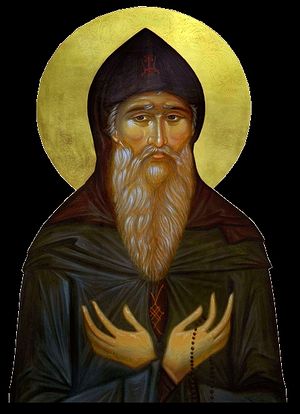 St. Basil of Poiana Marului St. Basil of Poiana Marului, who was the spiritual father of St. Paisius Velichkovsky, says that in order to acquire the prayer of the hearth where the mind descends into the heart, and then from there you can speak to God from your heart, which is hesychasm, it is necessary that the body and the soul were created together. It’s necessary to understand that man is one whole. You have to believe and understand and practice your faith as if these things are integrally united.[39]
St. Basil of Poiana Marului St. Basil of Poiana Marului, who was the spiritual father of St. Paisius Velichkovsky, says that in order to acquire the prayer of the hearth where the mind descends into the heart, and then from there you can speak to God from your heart, which is hesychasm, it is necessary that the body and the soul were created together. It’s necessary to understand that man is one whole. You have to believe and understand and practice your faith as if these things are integrally united.[39]
Scripture itself also interprets this passage literally. Job 38:14 says, Or didst thou take clay of the ground, and form a living creature, and set it with the power of speech upon the earth?
In early lectures we talked about how different the Scriptural Creation is from the myths, such as the Enuma Elish. Here’s one essential point. We see how much care God is giving to man, whereas in the Enuma Elish man is an afterthought. “Oh, yeah, we’ll create man too,” and he’s just there to serve the gods. There’s no understanding that man is the great summit of creation.
We’ll have to cover the creation of Eve next time.

